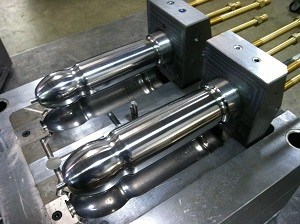There is a large selection of different types of steel used for various applications in the manufacturing of all types of products.

In the injection molding industry, there are common steels used for different parts of an injection mold. One of the driving forces of steel selection for an injection mold is the size of the mold. For smaller scale molds, the cost of the steel to be used is a very small percentage of the total injection mold cost versus a large mold where the cost of the steel could make or break the profit on the final cost of the mold.
When quoting an injection mold, the exact type of steel does not need to be known. However, it must be known if the steel is going to be heat treated or not. If the steel is going to be heat treated, the price being quoted must include the roughing of the cavities and cores and also the finishing of the cavities and cores after heat treating. If there are moving parts in the mold, it must also be determined if wear materials are going to be used for gibs and/or wear plates.
The material that is most commonly used is bronze aluminum which is costly and extra care in machining and grinding needs to be used. Toth Mold/Die Inc. uses S-7 type steel for the majority of their injection molds. One of the main reasons is the stability of the steel in heat treating. If an injection mold requires a high polish, Toth Mold/Die Inc. uses a 420 stainless steel. This type of steel offers a superb finish and also does not rust after it is heat treated. Other types of steel commonly used in the injection molding industry for cavity and cores are H-13, A-2, D-2 and O-1. All of these types of steel need to be heat treated to benefit from all of their properties. The hardness ranges of these steels are pretty close to the same. Care should be taken not to heat treat too hard which will end up making the steel too brittle and will have a good chance of cracking during the injection molding process.
For the majority of the plastics being injection molded, I recommend the steel not be heat treated above 58 RC. A hands down steel choice for Toth Mold/Die Inc. for steel that does not require heat treating is P-20. This is a pre-hard steel which is usually 30-32 RC. There is also a grade P-20 HH which is a high hard version getting up to 38 RC. In the injection molding industry, there is no standardized steel selection. It is usually the moldmaker’s preference.
